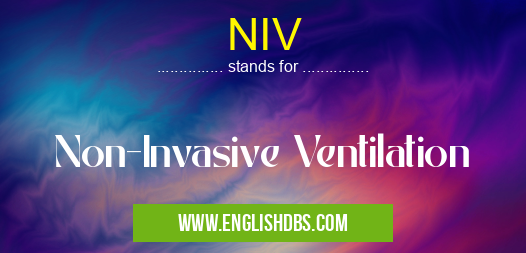What does NIV mean in PHYSIOLOGY
NIV or Non-Invasive Ventilation is an acronym used in medical circles to refer to a form of respiratory support therapy. It is an alternative to the traditional invasive ventilation that makes use of intubation to assist the patient breathe but it does not involve directly placing a tube into the patient’s airway. It is typically used as a form of treatment for patients suffering from some kinds of acute respiratory failure due to a variety of diseases and disorders including Chronic Obstructive Pulmonary Disease (COPD) and Congestive Heart Failure (CHF). NIV can also be utilized for cases where conventional mechanical ventilation is not feasible or practical.

NIV meaning in Physiology in Medical
NIV mostly used in an acronym Physiology in Category Medical that means Non-Invasive Ventilation
Shorthand: NIV,
Full Form: Non-Invasive Ventilation
For more information of "Non-Invasive Ventilation", see the section below.
» Medical » Physiology
What NIV Means
NIV stands for non-invasive ventilation. In simple terms, it is a type of respiratory support which helps a patient breath without having to directly insert a tube into their airway. This type of therapy involves utilizing various devices such as nasal cannulas or face masks that are connected to breathing machines in order to deliver oxygen and moisture to the patient's lungs, with the aim of improving the patient's breathing capacity and ultimately reducing shortness of breath. Today, this type of therapy has become commonplace in hospitals and other medical institutions around the world due to its advantages over traditional methods which include reduced risk of infection, less discomfort for the patient, shorter recovery times and easier monitoring capabilities.
Advantages Of NIV
As mentioned before, Non-Invasive Ventilation has several advantages over more traditional forms of mechanical ventilation such as intubation. These include reduced risk of infection since there is no direct contact between the tube/mask and the airways, less discomfort for the patient during treatment, shorter recovery times and better monitoring capabilities since all data is displayed on monitors attached to the device. Since this method does not involve any direct contact with airways therefore it causes minimum trauma or damage which makes it more preferable compared to other forms of mechanical ventilation such as intubation. Other than this, NIV also plays an important role in reducing hospital stay lengths by providing quicker relief from symptoms due to its efficacy in treating COPD and other types respiratory complications in critically ill patients.
Essential Questions and Answers on Non-Invasive Ventilation in "MEDICAL»PHYSIOLOGY"
What is Non-Invasive Ventilation (NIV)?
Non-Invasive Ventilation (NIV) is a type of support used for people who have difficulty breathing due to respiratory problems, such as COPD or asthma. It involves using a mask connected to a machine to provide a continuous flow of air into the lungs. This helps the patient maintain normal levels of oxygen in the blood and reduces strain on their lungs.
Who may need NIV?
NIV can be beneficial for many people suffering from respiratory issues such as COPD or other lung diseases, chronic obstructive pulmonary disorder (COPD), asthma, sleep apnea, and carbon monoxide poisoning. It may also be beneficial for individuals with neuromuscular disease that affects breathing.
How does NIV work?
The NIV system works by delivering pressurized air through a mask or nasal pillows placed over the mouth and nose. This pressurized air causes the diaphragm and chest wall muscles to relax, allowing more air to enter into the lungs during each breath. The pressure then helps keep these airways open so that more oxygen can be delivered to your body’s cells.
How long does an NIV session last?
Generally, an NIV session will last from 30 minutes up to 8 hours depending on the severity of the patient's condition and their individual needs. During this time, patients can rest or sleep while receiving continuous support for their breathing difficulties.
Are there any side effects from using NIV?
Like any medical treatment, there is some risk associated with using NIV therapy; however most side effects are relatively minor and temporary. Common side effects include irritation of nasal passages, feeling breathless if mask leaks are present, dryness in mouth/nose after long sessions of high flow oxygen delivery or pressure setting too high leading to discomfort in chest/throat area.
Are there any precautions I should take when using NIV therapy?
Yes - it is important that you use your NIV system correctly in order to achieve optimal results and avoid any potential harm or discomfort caused by misuse. Make sure you follow instructions provided by your healthcare provider regarding how often you should use it and what settings are appropriate for your condition.
Final Words:
To conclude, Non-Invasive Ventilation (NIV) has quickly gained popularity among healthcare professionals due its advantages over traditional forms of mechanical ventilation including intubation due its ease-of-use, lower risk factors associated with infections as well as decreased traumatic response from patients who would otherwise have difficulty coping up with more aggressive methods such as intubation. NIV is now commonly used across different fields ranging from emergency department visits all the way up till end-stage care for chronic illnesses including COPD & CHF among others making it one of most preferred option when it comes ventilatory support management.
